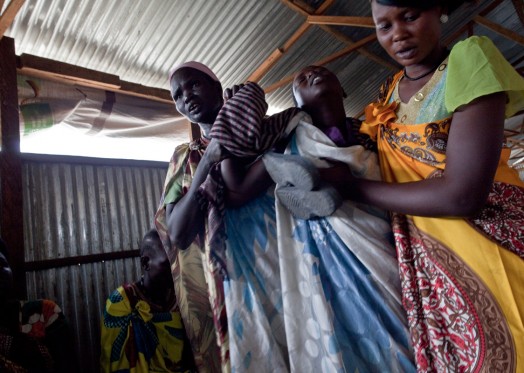The gates of hell

From above it looks like an ancient Roman encampment in the middle of nowhere: hoary plastic roofs in regular rows split in geometrical sectors with wider go-through lanes of mud; tiny swirls of smoke billowing in the muggy weather, swamps all around. Down on the ground you get closer cautiously. To enter you must show a proper ID, then you’re allowed to cross the gates, guarded by private security and military police. The Bentiu PoC, or Protection of Civilians site, in the blood drenched South Sudan northern state of Unity, is not a standard refugee camp: it is surrounded by razor fences, manned watchtowers and heavily armed blue helmets from two full Ghanaian and Mongolian battalions.
The PoC is home for 130,000 Nuers displaced by the war, a seemingly never ending fighting that is tearing apart the world’s newest nation (independence declared in 2011), now well on the way to become a failed state. The power struggle between the Dinka majority and the Nuers has plunged one of the planet’s poorest countries in a hellish spiral of violence: multiple massacres, rapes, burned villages, pogroms, marauding militias, bloody ambushes, cattle raids, ethnic cleansing and all the horrors we saw during the Rwandan genocide.
For hundreds of children born inside the camp, some already three years old toddlers, the gates and the concertina fences are the limits of their horizon, the end of the world.
Living conditions in the camp are harsh. Some food, water, education and health care are provided by the UN agencies and a bunch of Ngos. But it’s a dauting task. The shelters are overcrowded and more refugees are coming every day: they have lost everything, the house, the cattle, their belongings, their parents, their children, their husbands, their wifes. They must endure the heat, the flies, the mosquitos, the stench of the latrines. Women are raped when they go out in the forest to fetch wood for the fire, and they are even assaulted inside the PoC.
Now the rainy season has started. And with the rains a sea of mud engulfs the camp and the whole country, making the roads impassable, obstructing the aid relief and spreading diseases: malaria, cholera, watery diarrhoea, TB, malnutrition. The children, the weakest, are the first to go.
On sundays, on a short break, the hell gives way to a petty paradise. Gathered in thatched huts working as churches, the deeply religious Nuers sing and dance and pray the Lord. The only one chance they have still in store is betting their lives in the name of God.





